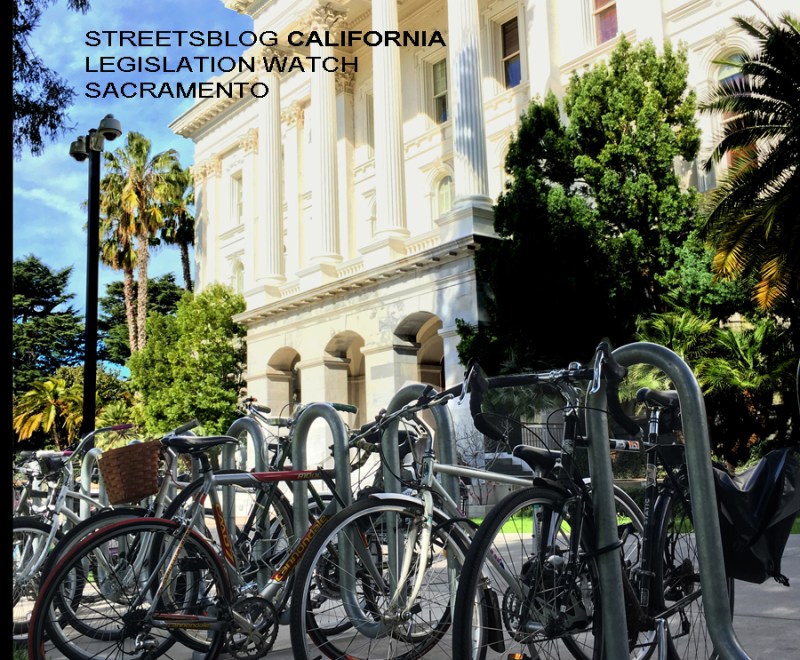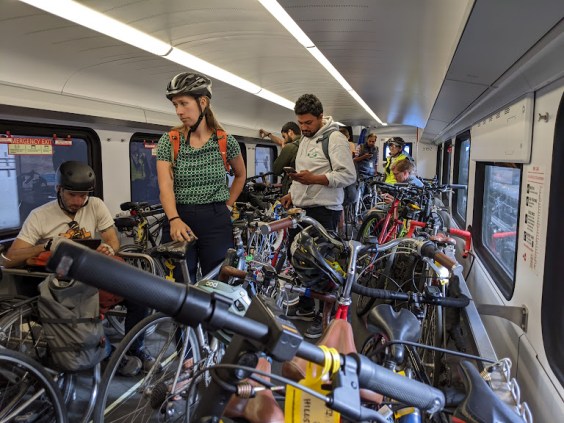Yesterday the Assembly Transportation Committee heard and passed a number of bills related to sustainable transportation, among others. In addition to the traffic safety bills discussed below, the committee also passed Senator Blakespear's S.B. 1098, to create a regional working group on the Los Angeles-San Diego-San Luis Obispo (LOSSAN) rail corridor. The bill, which has passed every committee without opposition, will next be heard in the Senate Appropriations Committee.
Speed Notification
Senator Scott Wiener has doggedly been pushing his bill to require in-vehicle speed limiters, S.B. 961. It's been an uphill battle against opposition from the auto industry, and in the process, bits of it have been falling off and rolling away. Wiener introduced it as a requirement for all cars to incorporate active speed limiters, and included a provision that trucks have side guards to keep people and cars from being sucked under their wheels. In its current state, it would only require all new cars to incorporate existing technology that would beep at a driver when they go over the speed limit - by 2030.
But the auto industry is still fighting it. Representatives from the Alliance for Automotive Innovation, Honda, California New Car Dealers Association, Toyota, Mercedes Benz, and others showed up to the committee hearing to oppose the bill. "Let the federal government do its work," they said, adding that the National Highway Traffic Safety Administration (NHTSA) is "aware of the technology" but so far has not required them to incorporate it.
"We're in a traffic safety crisis," said Senator Wiener. "More than 4,000 people die in traffic crashes every year in California, and speeding is a major factor in many of these fatalities. This is not normal; this is not the way it is in other countries. It is a policy choice we made by prioritizing speed."
Studies show that passive intelligent speed assistance technology is effective, he said, and recent survey results say that people want it. "Toyota will start installing this tech in all of their cars later this year," said Senator Wiener. ("I think you may be misinformed about that," said the Toyota rep - but many Toyota models already have it. The internet is full of queries about how to disable it, too.)
Some of the committee members worried about getting ahead of federal regulations, but Senator Wiener rejected that concern. "The NHTSA has not taken a position," he said. "This is not preemption." If the federal government were to require something in the future, that would automatically preempt any state law, but the absence of federal rules does not prevent a state from making its own. "I understand manufacturers don't want to be told what to do," he said. "They didn't want to put in seat belts; they didn't want to put in air bags. How many people's lives were saved by seat belts and air bags?"
The bill passed and is headed to the Assembly Committee on Privacy and Consumer Protection.
A somewhat related bill, the "Safe Roads Act" - S.B. 1313 from Senator Angelique Ashby - also passed during the hearing. It would prohibit the making, selling, or installing of any device that is designed to interfere with a vehicle's safety systems. These so-called "nag reduction devices" can, for example, simulate the pressure of hands on the wheel so that a driver could take their hands away without having to deal with the beeping from a passive notification system. Presumably this would also apply to any passive speed notification system.
E-bike Safety
Senator Dave Min's bill, S.B. 1271, would make several changes to e-bike regulations. First, it would require any bikes sold, leased, or rented in California to have batteries that meet EU or UL safety certification, to prevent the kinds of horrific battery fires that have happened with cheaper batteries.
Second, it would clarify what classifies as an e-bike. S.B. 1271 would redefine Class 1 e-bikes to make it clear they cannot be capable of propelling the bicycle without use of the pedals, and that they cannot be capable of providing assistance past 20 mph. Class 3 e-bikes are redefined under the bill to clarify that the motor is not capable of exclusively propelling the bicycle without using the pedals. This would ensure that a class 3 e-bike cannot have class 2 capabilities, that is, with a throttle assist up to 20 mph, and a pedal assist up to 28 mph.
If a bike is capable of going above that speed with motor assistance of any kind, it is considered a moped or electric motorcycle, and subject to a different level of regulation (requiring a license and helmet, for example). The bill also clarifies a problem with some e-bike models that are sold as class 2 e-bikes but can be switched to an “off-road mode” that is capable of going faster than 28 mph with a throttle. The bill would define any e-bike that is "switchable" between modes as Class 3 e-bikes, which are illegal for anyone under 18 to operate. And if they can go faster than 28 mph, they would not be classified as e-bikes.
The bill was passed forward to the Senate Committee on Emergency Management.
Speed Camera Pilot Program
S.B. 1297 from Senator Ben Allen would create a "speed safety system pilot program" - similar to last year's A.B. 645 from Assemblymember Laura Friedman - specifically for Pacific Coast Highway in Malibu.
"Literally every couple of months there's a devastating crash here," said Senator Allen in introducing it. "Several people have died on this stretch of highway since I introduced this bill." A friend of the four Pepperdine University students who were killed last year by a speeding driver there provided some heartbreaking testimony about the effects of that crash.
No one argued against the need for speed reductions, or even the efficacy of speed cameras. Friedman's bill is still being implemented in the six cities that are piloting it, and no data has been collected on them yet. The only hesitation came from people who said more places than just Malibu want to be able to use speed cameras. Committee Chair Lori Wilson, saying she was involved in a separate conversation about broadening the speed camera program statewide, did not vote in favor of the bill.
"My concern is about a larger [ongoing] conversation," said Chair Wilson. "This needs to be part of that. There are other [cities] that want speed cameras. Assemblymember Friedman's bill took probably ten years to finally get to a place where that bill passed. But state highways are different; there are larger conversations to be had about their role, and about protecting workers. Because of that broader conversation, I can't support this bill today, but I'm not holding any other committee members to that position."
Streetsblog hasn't been able to find out where that broader statewide conversation is happening. Last year Wilson's committee killed a bill on the topic from Assemblymember Matt Haney. A.B. 2809 aimed to develop and implement a state highway work zone speed safety program using automated speed enforcement systems, but it didn't even get a hearing in this committee.
The bill passed with one "no" vote from Chair Wilson, and moves on to the Assembly Committee on Privacy and Consumer Protection.






